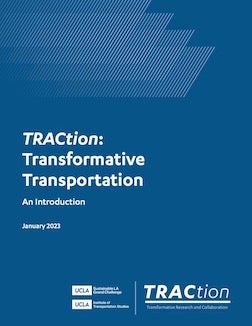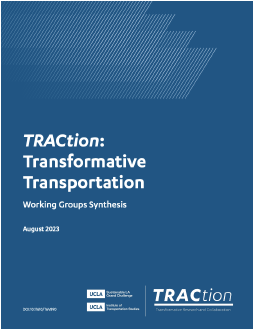
The Sustainable LA Grand Challenge (SLAGC) is pleased to formally partner with UCLA’s Institute of Transportation Studies (ITS) to pilot the first two-year cycle of this programming, which will thematically focus on Transforming Transportation in Los Angeles.
ITS serves as an ideal partner to launch this programming given its long-standing success in forging partnerships both inside and external to the university and delivering timely and impactful scholarship at the regional, state, national and global levels.
SLAGC and ITS are excited to bring everyone together to identify the most stymying barriers to transforming transportation in the Los Angeles region, and develop a shared vision for what matters most — then start to develop a plan for what we can collectively make progress on together. Please direct any questions by email to TRACtion@ucla.edu.
TRACtion: Transformative Transportation, An Introduction

TRACtion: Transformative Transportation, Working Groups Synthesis

Kickoff Event
Morrison Room (formerly California Room) at UCLA Faculty Club
The keynote speaker was California Transportation Secretary Toks Omishakin, who presented California's vision for a transition to equitable and sustainable integrated transportation land use systems.
At this kickoff event, researchers from UCLA heard perspectives on a just transition for transportation from Los Angeles leaders, community organizers, and advocates. UCLA researchers and those external invitees had an opportunity to connect and discuss mutual interests.
Working Groups
The TRACtion Working Groups bring together UCLA faculty and researchers and community-based and advocacy organizations in Los Angeles County to assess barriers and begin to develop research agendas to address those barriers.
External participants include: Alliance for Community Transit — Los Angeles (ACT LA), CicLAvia, Climate Resolve, Communities for a Better Environment, East Los Angeles College, East Yard Communities for Environmental Justice, GRID Alternatives, Los Angeles Walks (LA Walks), Mobility Justice Strategist from L.A. Department of Transportation (LADOT), Move LA, People for Mobility Justice, Prevention Institute, Re:Ciclos, South Los Angeles Transit Empowerment Zone (SLATE-Z), Strategic Actions for a Just Economy (SAJE), Streets are for Everyone (SAFE) and TreePeople.
UCLA participants include faculty and researchers from: David Geffen School of Medicine, Fielding School of Public Health, Luskin School of Public Affairs, Samueli School of Engineering, School of Arts and Architecture, School of Law, UCLA College (Humanities, Physical Sciences, Social Sciences) and UCLA Library Data Science Center
The working group meetings have resulted in thoughtful discussions between UCLA and external experts to apply tacit and explicit knowledge toward identifying barriers to an equitable transition to transportation sustainability in L.A. Many of these barriers are knowledge deficits, but importantly, TRACtion isn’t shying away from barriers that don't directly result from knowledge deficits, such as values, power and political barriers, and we look forward to UCLA and external partners exploring together, in depth, to identify opportunities for UCLA to support ameliorating these other categories of barriers through academics and service. A synthesis of outcomes from these working group discussions will be released in summer 2023.
The five working group themes and brief descriptions are as follows:
Access to Opportunities
Enhancing through transportation people’s access to jobs, services and other needs, and doing so equitably. Topics include:
- Equitable distribution of mobility and access benefits and investments
- Incorporating accessibility measures into transportation decision-making
- Reducing combined housing + transportation costs for the most cost-burdened Angelenos
- Phasing out fossil fuels without exacerbating inequities in access to opportunities
- Equitable access to parks, medical care, social opportunities and other benefits of mobility
Phasing Out Fossil Fuels
Reducing or eliminating greenhouse gas emissions and other particulate emissions resulting from the movement of people and goods. Topics include:
- Transportation-related emissions and impacts
- Reducing emissions exposures in the most impacted communities
- Ultrafine particulate (UFP) effects on human health
Reimagining Transportation
Understanding and/or steering social and political values that influence how decision-makers approach transportation plans and investments. Topics include:
- Transportation user safety as a political or values issue
- Elevating the basic needs of those who do not drive
- A transportation system that supports a regenerative economy
- Assessing the capacity of the bureaucratic state to transform transportation planning, policy and funding
Resilient Transportation
Examining how transportation infrastructure can meet the evolving needs for how people can reliably move across a climate-impacted Los Angeles. Topics include:
- Adapting transportation infrastructure for climate and biodiversity
- Cascading climate and non-climate impacts on transportation
- Climate-impacted use of the transportation system
- Mobility in disasters
Safe and Healthy Transportation
Making the region’s transportation systems — both public and private — safe for everyone, regardless of race, gender and other factors. Topics include:
- Physical safety from traffic violence
- Physical and psychological safety from traditional transportation enforcement approaches
- Transportation as a social determinant of health
Get Involved
UCLA faculty and researchers who are interested in learning more and engaging with TRACtion are encouraged to contact Jennifer Craer, Director of Research Development for the Sustainable LA Grand Challenge, at TRACtion@UCLA.edu.




